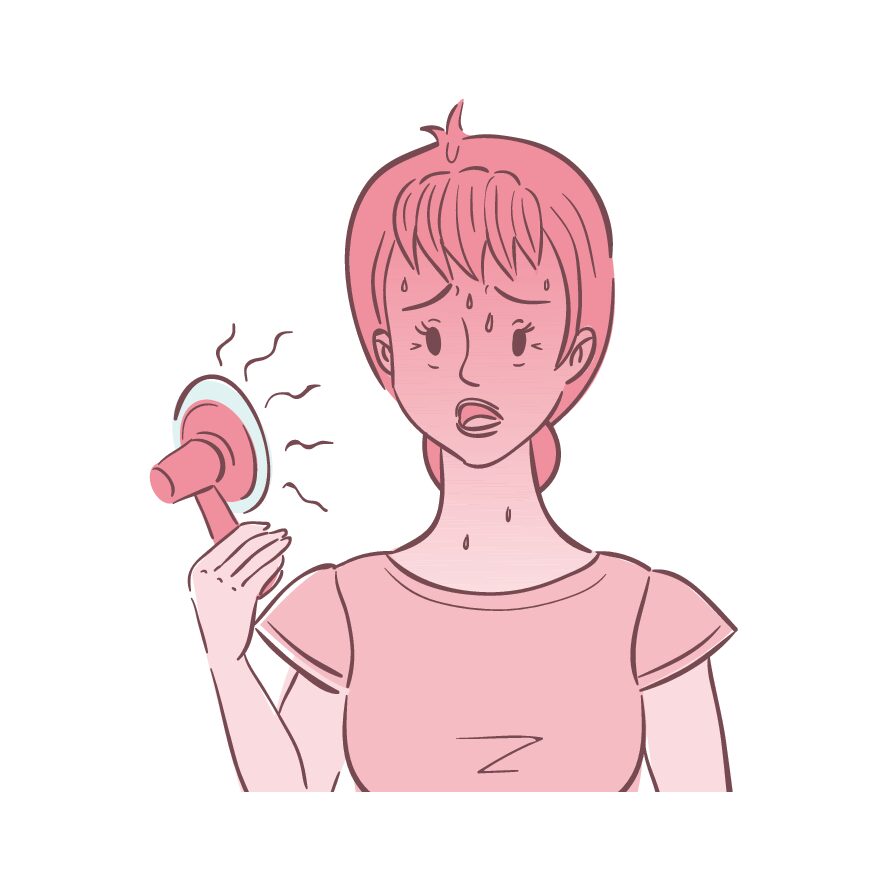
You feel a sudden warmth spreading through your chest, face, and neck.
The heat intensifies until it feels like you’re on fire. Your heart is racing. You might feel dizzy or lightheaded. You may feel anxious or nauseous. You sweat—a lot.
A few minutes later, it passes, and now you’re cold.
You’re not sick. You’re just having a hot flash – a common experience for women during the menopause transition.
Possible Explanations For Hot Flashes
Vasomotor symptoms (the clinical name for hot flashes) are not fully understood. It’s likely the result of many different mechanisms that converge to trigger the symptoms you feel.
One leading explanation involves a narrowing of the thermoneutral zone.
The hormonal changes associated with menopause especially elevated norepinephrine and low estrogen levels, appear to narrow your body’s sensation of “too hot and “too cold.”
Your body thinks it’s overheating, so it opens up your blood vessels and sweats to cool you down. Then it feels too cold, so you start shivering. It doesn’t mean your body is too hot or cold; instead, more minor changes trigger the reactions.
Everyone’s body temperature fluctuates a little bit throughout the day and night. Still, if your neutral zone is smaller and more sensitive, these slight changes can more easily trigger a thermoregulatory response.
The Link Between Menopause and Heart Disease
While it was commonly believed that hot flashes are merely a quality of life issue and not an actual health concern, there is growing evidence that they may, in some cases, indicate an underlying cardiovascular problem.
Since 1996, the Study of Women’s Health Across the Nation (SWAN) has been tracking and assessing the long-term health of 3302 women of diverse backgrounds entering menopause. This has allowed researchers to discover patterns between various risk factors, biochemical changes, genetic profiles, and health outcomes.
These findings suggest an association between hot flashes and adverse vascular changes such as increased calcified plaques in the aorta and lowered flow medial dilation (the stretchability that blood vessels need when blood pumps through). These stiffening effects are linked to cardiovascular disease, coronary heart disease, and stroke.
This doesn’t mean your hot flashes will lead to heart problems. Hot flashes may represent a healthy response to standard, early-stage menopausal changes. More research is needed into hot flashes at different stages of menopause and what they mean.
Early Detection of Cardiovascular Disease
Many of the risk factors associated with increased hot flashes are also the risk factors for cardiovascular disease, including:
- smoking
- obesity
- high blood pressure
- inadequate nutrition
- depression
- financial strain and other life stressors
- family history
- aging
Stopping smoking is the most significant modifiable risk factor for improving health outcomes and reducing the incidence of hot flashes.
Hot flashes are the most common symptom that drives women to their doctors during menopausal. This gives an excellent opportunity for early detection and monitoring of potential cardiovascular diseases and can allow you to get the treatment you need as soon as possible if you need it.






















